The programme of talks and demonstrations for the second PPC Live event in Peterborough on 16 March consisted of some well visited and expected subjects peppered with some more curious.
Kicking off the talks was one of the more curious, entitled The digital landscape – right audience – right message – right channel. Early birds at the event heard Jane Shepherd from Shepherd PR run through the basics of promoting your business. She explained how to generate good PR covering everything from traditional printed newspapers to social media.
| One of the key take home messages was, if you have a website, or indeed use any digital means of promoting your business, then be sure to regularly update it. In today’s fast moving digital age the old adage that today’s news is tomorrow’s fish and chip paper is even more pertinent, even if the health and safety Tsars have stopped us using newsprint for fish and chips! Daunting title but necessary knowledge Bearing out the London bus theory, that if one arrives another will be right behind, Professor Berny explained how late in 2014 the European Chemicals Agency (ECHA) recommended that anticoagulants be classified as ‘Reproductive Toxicants’. Editors note: It is our understanding that EU Member States were to be asked to vote on this last month – see our article in Pest Issue 43 February & March 2016. However, it is far from clear whether this vote took place. We will update you as soon as we can find out.) The implications of such a reclassification are serious. It will mean that products will not be permitted on the market at concentrations above 30mg/kg for amateur use (eliminating first generation anticoagulant rodenticides and even possibly difenacoum and bromadiolone from the amateur market). The industry would have to cope with customers whose internal policies will not accept reproductive toxicants onto their sites and pest controllers would likely face the risk of yet more difficult to defend claims by those citing health issues resulting from exposure to anticoagulants. We may also be confronted with the need for users to wear additional PPE when applying anticoagulant rodenticides. Little flies Are they of public health significance? Most definitely, said Professor Anderson. Bacterial counts on individual flies showed high incidence of Salmonella. Recent studies have demonstrated that E.coli can proliferate on housefly mouthparts as they are kept moist by the repeated regurgitation of the gut contents. House flies may be a different species but they share a similar physiology with the Drain flies! Working in the food industry These ranged from the obvious ‘know the specification the plant is working to’ (not that it is always easy to get your hands on copies of some of the specifications, nor keep up with changes that are regularly made to these) to one of the biggest pitfalls pest control companies new to this sector can fall foul of, ‘pricing the job right’. He concluded that good communication is essential – and that’s across the board, not just between client and pest control managements, but also internally to ensure technicians are up-to-speed and that client staff on the shop floor also know the score. There may be pitfalls to working in this sector but there are also plenty of opportunities to make a difference and earn a good return, he concluded. |
|
|
| Making sense of mammalian scents Concluding the technical seminar programme was Professor Jane Hurst from Liverpool University. She updated delegates on the work begun in Liverpool back in 2012. The idea is simple rodents use scent cues for all sorts of everyday activities so why not manipulated those cues to improve the effectiveness and sustainability of rodent control – similar to employing insect pheromone traps. The problem is scent communication between mammals is many time more complex than in invertebrates. Unravelling these complexities has been taxing some of the best minds in Liverpool but the good news is that progress is being made. Professor Hurst announced that the team can confirm there is considerable potential in using rodent scents to manipulate behaviour, including attracting rodents to control points, repelling animals from sensitive sites and reducing bait take by non-target species. She also saw a role for rodent scents in understanding where problems arise. However, she warned, making effective synthetic cues is a major challenge. |
||
| Outdoor demonstrations As well as the standard classroom seminars you could brave the biting easterly wind to see a number of outdoor practical demonstrations. A representative from Arco, the RPE supplier, posed the question Is the RPE you’re wearing protecting your health? indicating that ‘Face Fit’ testing went much further than putting the palm of your hand over the respirator filter and breathing in. Along with suitability of RPE for individuals with facial hair and or spectacles, more stringent testing was likely to become the norm in the not too distant future. The curious ‘Smart Trap’ was demonstrated by 4 World Designs. Heralded as ‘the world’s first discriminating rat trap’, animals entering the trap cross a weigh plate. Anything smaller than an adult rat is released through a side hatch whilst rats are quickly and humanely electrocuted, using energy from the solar panels fitted to the unit. |
|
|
| Animals larger than a rat are unable to enter the trap. The trap can hold up to 20 dispatched rats and is equipped with a SIM card so that a message can be sent to a SmartPhone when kills are made. In an age of permanent baits being the last, rather than the first option, there may be a market for these in non-public areas where re-infestation by rats is continual and inevitable. | ||



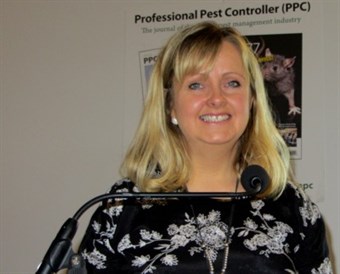 Jane Shepherd stressed the importance of keeping websites and other digital outlets regularly updated
Jane Shepherd stressed the importance of keeping websites and other digital outlets regularly updated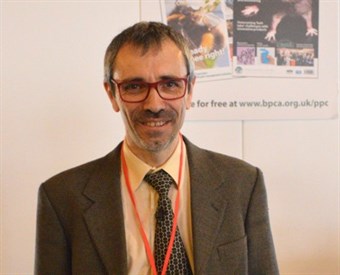
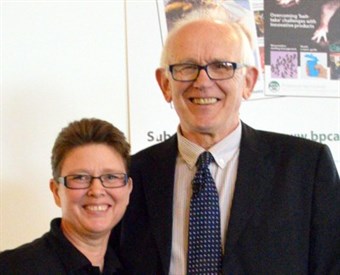
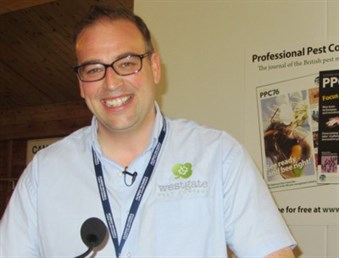 …whilst Paul Westgate shared his top tips for avoiding non-compliances in the food sector…
…whilst Paul Westgate shared his top tips for avoiding non-compliances in the food sector…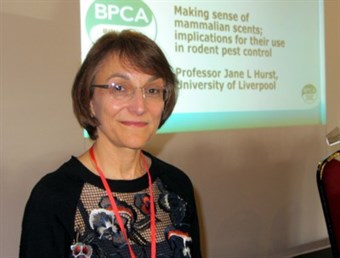 …and Professor Jane Hurst gave a fascinating talk on how research into the ways rodents use scent could come to the aid of pest controllers in the not too distant future
…and Professor Jane Hurst gave a fascinating talk on how research into the ways rodents use scent could come to the aid of pest controllers in the not too distant future